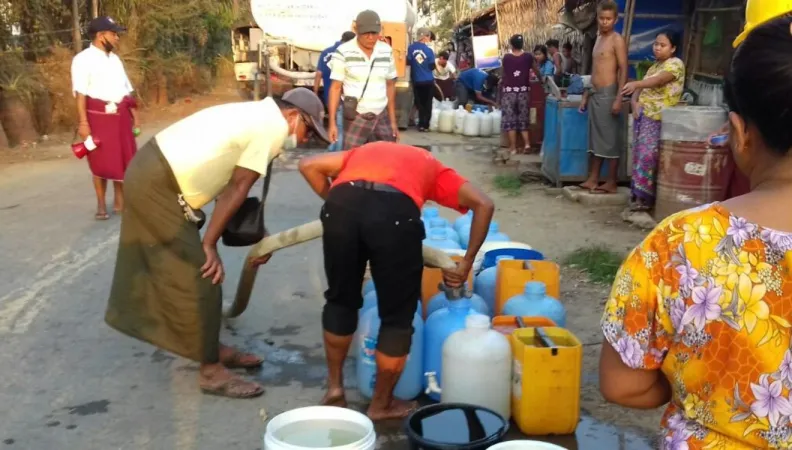Share the page
Covid-19: Reducing Risks for Yangon's Most Vulnerable
Published on

In the Burmese capital of Yangon, poor neighborhoods are extremely vulnerable to communicable diseases such as Covid-19. Not only is “social distancing” impossible for those who live in overcrowded areas. They have limited or no access to high-quality health or hygiene facilities.
The Doors of Economic Activity Slam Shut
They are also particularly exposed to the economic impacts of the Covid-19 crisis, as most residents are daily casual workers whose sources of income have disappeared since the outbreak of the epidemic. This is because economic activities have been brought to a halt (the closure of textile factories for example, along with any accompanying services for workers), or because of local decisions (for example, restrictions on street food vending in Yangon). Now the position in which they find themselves could be more precarious than ever.
The Bawa Pann Daing project, which has been financed by AFD since 2017, aims to increase the resilience of informal settlements in Yangon. In addition to conducting studies to identify the most vulnerable neighborhoods, two NGOs, Green Lotus and ActionAid, are working with communities, especially in the “Ward 67” informal settlement. The objective is to diversify their livelihoods by developing social business, defend their rights and empower women.
Raising awareness
In the face of the COVID-19 epidemic, which has been sweeping Myanmar for several weeks, these two NGOs have taken action to provide an emergency response: community leaders in “Ward 67” have been mobilized to distribute 3,000 bars of soap for frequent hand-washing. They relay information about the virus to residents, in particular concerning other effective prevention and protective measures, through brochures produced by the Myanmar Ministry of Health.
A discussion group has also been set up on the instant messaging application Viber to share information between community leaders and NGOs, both about people’s needs and actions taken by local government.
Meeting basic needs
Furthermore, to address the increase in the poverty and economic vulnerability of the residents of these neighborhoods, the two NGOs assess their needs for basic necessities. For example, they were alerted about a drinking water shortage through the Viber group and delivered over 68,000 liters of water to 2,000 priority households in a week.
The communities also alerted them about their lack of basic food items, such as rice, oil, beans and potatoes. This time it was the local government which dealt with the emergency response. The consortium of NGOs handled the coordination and follow-up to ensure the actions implemented were complementary.
Advocacy is conducted to ensure that the needs of residents in these areas are taken into account in the health action plans developed by the authorities in the city of Yangon.
AFD Stands Behind NGOs
In addition to this initiative, AFD is stepping up its support for NGOs to address emergencies related to the Covid-19 crisis, in terms of health and food. At least €150 million of grants will be mobilized, with Africa as a priority. AFD, along with a number of governments, is also preparing the longer-term response to the health, social, economic and financial impacts of this crisis by mobilizing €1 billion in the form of loans.
This financing may take the form of support for health policies and regional and local authorities in difficulty, as well as budget support for national economic recovery plans, for example. The objective is to prepare, as of now, the reconstruction of the most vulnerable systems and make them more resilient.
